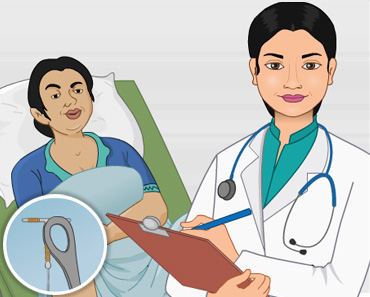Spacing of pregnancies helps in decreasing maternal, newborn and infant mortality. But in many parts of India like Bihar, there are some age old practices of early marriage and early childbirth. Women get married very early; almost 50% get married before they turn 18. 10% of the women become mothers in their teens. Bihar has one of the highest fertility rates in the country. On an average a woman here has about 4 children. This harms their health, makes them weak. Many even die. Even the babies born to very young mothers, or born in quick succession could be underweight, prone to illnesses or even die. In such a situation, it becomes very imperative to counsel the couple and the decision makers to adopt some form of family planning method.
ZMQ worked with JHPIEGO (Johns Hopkins Program on International Education on Gynecology and Obstetrics) has been providing technical assistance to the Government of India to help revitalize PPFP, with emphasis on PPIUCD. ZMQ developed and implemented ICT and mobile phone based post-partum Insertion of IUCDs for the Family Planning program in Bihar, Jharkhand and Chattisgarh. The objective of the mobile program is to train the paramedics and doctors all the aspects of PPIUCD insertion so that they carefully follow all these steps presented in the training program to ensure a safe and correct insertion, and reduce the chance of expulsion of the IUCD from the uterus. The training program also gives an overview of the appropriate infection prevention and counseling measures to help ensure the safety and well-being of the woman. In India, the training has been imparted to 2200 paramedics and nurses who are employed in the rural areas in Jharkhand, Chattisgarh and Bihar. It is now being used by National Rural Health Mission of the GOI. The same program has been adapted for Paraguay (in Spanish), Mozambique (in Portuguese), Ethiopia (in Amharic) and Indonesia. Over, 10,000 have been trained in various countries across three continents.







